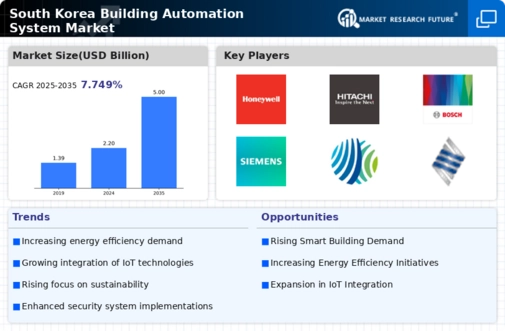South Korea Building Automation System Market Summary
The South Korea Building Automation System Market is projected to grow significantly from 2.2 USD billion in 2024 to 5 USD billion by 2035.
Key Market Trends & Highlights
South Korea Building Automation System Market Key Trends and Highlights
- The market is expected to achieve a compound annual growth rate (CAGR) of 7.75 percent from 2025 to 2035.
- By 2035, the market valuation is anticipated to reach 5 USD billion, indicating robust growth potential.
- In 2024, the market is valued at 2.2 USD billion, reflecting a solid foundation for future expansion.
- Growing adoption of smart technologies due to increasing energy efficiency demands is a major market driver.
Market Size & Forecast
| 2024 Market Size | 2.2 (USD Billion) |
| 2035 Market Size | 5 (USD Billion) |
| CAGR (2025-2035) | 7.75% |
Major Players
Honeywell, Hitachi, Samsung C&T, Bosch, LG Electronics, Siemens, Johnson Controls, Emerson, Toshiba, KACCESS, Daikin, Trane, Mitsubishi Electric, Schneider Electric




















